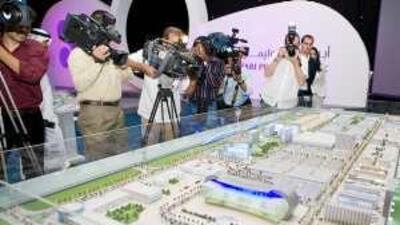The private sector will take a bigger role in industrial projects at a growing cluster of plastics plants at the edge of the capital. Abu Dhabi Polymers Park, a 450-hectare complex south of Musaffah, will rent out factory buildings and provide logistics services to plastic conversion firms, which turn plastic pellets into usable products such as artificial turf.
It aims to produce 1 million tonnes of plastic products by 2012 and attract US$4.4 billion (Dh16.16bn) in investment, said Mohammed al Qamzi, the senior vice president for Polymers Park at Abu Dhabi Basic Industries Corporation (ADBIC). The Government has long had a direct stake in industrial projects such as smelters, chemical plants and port facilities, but in Polymers Park the private sector will take the lead as the emirate expands its preferred role as services provider, Mr al Qamzi said.
"As the Government, we don't want to compete with the private sector. We are here to serve," he said. "At the end, the Government is there to support the economy and when it's sustainable and can grow, it will be part of the public. The public can buy into it and be part of the private sector." Polymers Park has been described as a key part of the Government's drive to diversify its economy away from crude oil exports.
Sheikh Mohammed bin Zayed, Crown Prince of Abu Dhabi and Deputy Supreme Commander of the UAE Armed Forces, attended the opening ceremony for the complex in June. The park will obtain much of its raw materials from plastics makers in the Gulf, including the Abu Dhabi National Oil Company's Borouge subsidiary, and sell about 40 per cent of products locally, Mr al Qamzi said. As it stands, raw plastic produced in the Gulf is sent to Asia and the West to be made into products, then exported back to GCC countries.
Polymers Park will offer foreign firms a chance to establish a foothold in the GCC, while local firms will have access to its infrastructure and low-cost raw materials, Mr al Qamzi said. He said Mina Zayed Port and lorries would transport goods to and from Polymers Park, until Khalifa Port in Taweelah and a proposed GCC-wide freight railway were opened. The railway will run alongside the site. Polymers Park could offer tenants transport savings up to "double-digit" percentages, Mr al Qamzi said, without giving a specific figure.
"We are on the service side, meaning good-quality services for the industrial side will be a benchmark for how industrial services should be," he said. "Today, we are building an industrial economy serving who? Serving the private sector, who are the real developers." ADBIC will enter into joint-venture agreements and invest up to $100 million to help bring in tenants, but it will spin those investments off as initial public offerings as soon as they become commercially viable, Mr al Qamzi said.
Thirty per cent of the park's space has been committed, with final agreements to be signed at the end of March, Mr al Qamzi said, adding that none of the tenants said they would pull out because of the global financial crisis. ADBIC has so far announced only one anchor tenant for the site: Low and Bonar, a British firm that will produce artificial turf in partnership with ADBIC. Other tenants will be announced when agreements are finalised. cstanton@thenational.ae

